Steven Universe is one of my favorite shows, and I’m heavily invested in its story, characters, themes and the way it frames the discussion of the tropes and plot elements it offers commentary on. Needless to say, I am fairly biased in my view towards the series. That isn’t to say I believe the show is perfect or is without flaws (that’s a separate discussion for another day), but I feel that it makes a lot of really good decisions for every slight misstep. I’m certainly not the first person on this site to discuss this series in particular, indicative of the fact of how much this show warrants significant analysis.
Regardless of my love for Steven Universe, I do believe it deserves to be viewed with a critical eye and critiqued and scrutinized to gauge just how well it does with going about its stated goals. According to Rebecca Sugar, the stated goal for Steven Universe is to:
“tear down and play with the semiotics of gender in cartoons for children because I think that’s a really absurd idea that there would be something radically different about a show for little girls versus a show for little boys”.
In this piece, I will be examining how well it does in fulfilling that goal, by studying how its protagonist Steven frames his identity within the shows universe.
A brief introduction to the character might be in order at this point. Steven is an adolescent boy who’s half human and half gem (a race of magical alien beings that came to earth millennia ago as colonizers) and his story is simultaneously about his self-discovery and growth within the larger plot of the ramifications of a gem revolution on Earth that took place long ago.
In tearing down the semiotics of gender, Rebecca Sugar has envisioned a male protagonist surrounded by a majority female cast. The resulting dynamics between the characters reflect this major shift in representation away from most television line-ups. Although we’re here to talk about Steven and his own conception of identity with regards to his gender, there is a lot more that can be said about the way the character dynamics of this series distinguish it from its peers.
Getting back to Steven though, he is introduced to the audience as being an almost total subversion of what is typical for male protagonists of adventure/urban fantasy series like Steven Universe started out being.
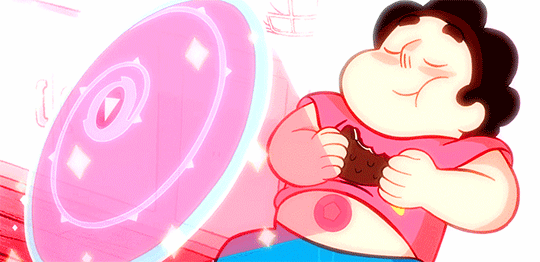
Like most heroes, Steven is young, male, adventurous and is unique due to his combined heritage as a human-gem hybrid. Unlike most heroes however, Steven is fat (less so as the series goes on and he becomes more active in the physical action of the series, though he does retain his chubby frame), boisterous, playful and quite emotional. Steven is presented as being the antithesis of most heroic tropes while still retaining that aspect of specialness that comes about from the circumstances of his birth.
His summonable weapon is a pink shield, in stark contrast to the more offensive tools at the disposal of the other Crystal Gems (who summon whips, spears and large fists). Steven’s position as barrier user (he can also manifest a protective bubble to surround him and those with him) within the group of heroes is one that would traditionally go to the sole female in a group of mostly male heroes. This is further exemplified by Steven’s other powers, such as the ability to heal, another traditionally feminine power given to the male hero. Though in a subversion of the typical healing tears power, Steven’s ability to heal manifests in his spit, a choice that retains an element of boyish grossness as you see Steven lick his hand to collect the requisite saliva to heal someone’s injuries.
On top of this, Steven very much feels comfortable with feminine coded activities and traits. He’s emotional and isn’t afraid to cry, he enjoys cooking and singing and is very much a caregiver to his supporting cast, offering emotional support and advice to many of the other characters at various points in the series. Steven isn’t the sort of person to feel offended or slighted at engaging in feminine acts, and at no point does it seem at odds with his stated gender identity that he enjoys those things.
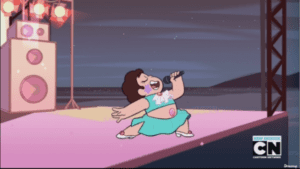
Steven Universe does an amazing job at breaking the boundaries of the gender binary and nowhere is that more clear than in the way its protagonist can simultaneously love both Crying Breakfast Friends and Lonely Blade as his favorite television shows.
At the onset of the series, Steven is not much use in the fight against the monsters the Crystal Gems face on a regular basis. The others clearly view him as The Load to their team, even as they attempt to be encouraging and paternal towards Steven learning to use his abilities. However, Steven is very much the typical male protagonist in that he cannot just stand idly by and not be a part of the action and adventure that’s out there. He wants to be of use to the team and tries his level best to learn how to deal with the monsters.
Much of his arc in the first half of season one is him learning how to be of use to the Crystal Gems in his own way, bringing his own unique flavor to resolving conflicts in many episodes, growing all the way. Steven is without a doubt going through a hero’s journey, just one that challenges the typical conventions of a hero’s journey being a masculine coded one.
On the surface, Steven’s story seems to be following the narrative conventions we’re familiar with when the hero’s story is also a coming-of-age story. However, where Steven Universe differs from other narratives of this ilk is with regards to how its male hero deals with the external conflict of the series in tandem with his own internal conflicts.
This is made most clear around the halfway point of the first season, when Steven is brought to the two-fold realization that the monsters the Crystal Gems have been fighting up to this point have been corrupted gems and that the true enemies of Earth are also other gems that seek to destroy or use the planet for their own means. This realization strikes a chord with Steven, and his pacifist nature shines through. As much as Steven wants to be a part of the action, he vehemently doesn’t want to do anything to hurt other living beings, human or gem. He loudly proclaims he doesn’t want to fight and summons his shield actively for the first time to protect his friends, rather than actively partake in the fighting.
He’s every bit the maternal, caring, healer archetype, right down to his rejection of violence. The difference here is that this archetype is represented by the series protagonist rather than a minor supporting character. And that is a significant part of the narrative that sets it leagues apart from others in its genre. The hero is never the one who opposes the use of violence. Even when they find it distasteful, the hero usually still engages in violent acts as a means to achieving a greater good. For Steven though, we see that his primary concern is always to protect those around him, never to actively hurt those who would harm him.
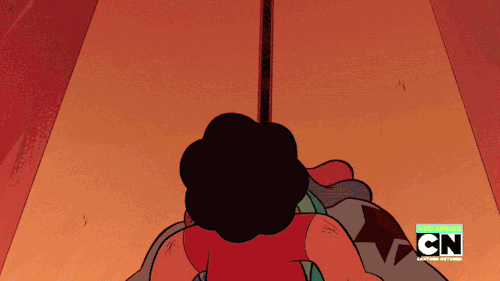
When Steven is forced to actively fight, he tries his level best to resolve the conflict with as little force as possible, and that still ends up taking a massive toll on his emotional state. He doesn’t want to hurt anyone and it almost breaks him to have to do so to protect himself.
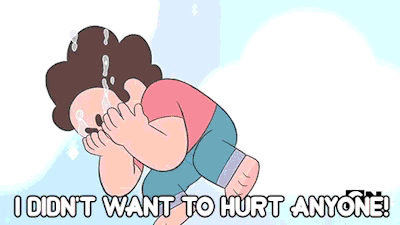
Later on, a significant part of his character arc grapples with the notion of taking a life, and whether it’s ever acceptable to do so under any circumstances. This is very heavy material for a children’s show and to its credit, it does not brush the subject under the rug or resolve it with a simple yes or no answer. These things are complicated, and unlike a lot of male heroes, Steven doesn’t just decide one way or another what is right. His convictions tell him it’s never the right thing to do, yet he cannot deny the fact that sometimes you don’t have the luxury of choosing not to be violent. His legacy is one that is drenched in violence for the sake of freedom, but unlike most male heroes, Steven doesn’t revel in it or use the ideal of freedom as an ultimate justification beyond reproach or criticism.
For all I’ve said about Steven Universe playing with and subverting the usual tropes in a story such as this, there’s one instance of it that proves beyond a doubt that Steven is meant to act as an expression of stereotypically masculine heroes and the issues present in telling their stories. In the first episode of season 2 “Full Disclosure”, Steven is reeling from a recent gem incursion to Earth where he and the other Crystal Gems were beaten and abducted onto an alien ship as prisoners before managing to escape captivity. Steven is forced to confront the reality of his adventures and how dangerous they really are when he sees his father have a panic attack after being told of the events that took place.
This causes Steven a lot of anxiety as he doesn’t want to cause trouble for his loved ones by making them worry. After some terrible advice from the local town idiot, Steven sees pushing away his loved ones to protect them as his only option.
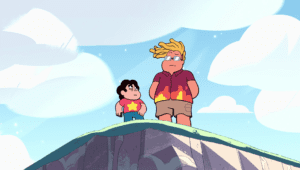
This is a very common trope in a lot of superhero media; the hero must cut ties with those he is close to in order to keep them out of harm’s way. Lest the villain take advantage of his love for them or harm them to get to him. In most cases, it’s played straight and seen as the right thing to do for the hero to sacrifice his personal relationships for the sake of their lives.
In Steven Universe, it’s very much the stupid thing to do. The audience is still meant to sympathize with Steven’s plight, but the whole thing is framed in such a way to highlight just how ridiculous and short-sighted a move this is as Steven tells his best friend and crush Connie that he can’t have anything to do with her anymore. The audience is clearly meant to see this as Steven making a massive mistake as the focus shifts to how much pain Steven suddenly avoiding her causes Connie. She feels as if she’s the one at fault and fearful that she’s going to be left alone without her closest friend. When she confronts Steven about this, he is overcome with how much he cares for her and withdraws his previous statements about not wanting to be friends anymore.
The true resolution and proper end for the episode comes with them talking about what happened and resolving to always be supportive of one another. Steven gains renewed faith in his friends and loved ones as capable individuals in their own right, instead of viewing them as extensions of himself and his connections to them as a weakness. This episode took a hard look at the traditional hero’s narrative of wanting to protect those around him by cutting them off for their own safety and came to the conclusion that such an action is not only wrong but also dangerous in its own way. It only serves to weaken the hero by cutting off his support network and ability to empathize with others at the knees.
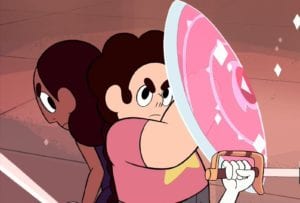
Steven Universe does a lot to examine the elements of the traditional hero’s journey and typical masculine coded character traits. And what it comes out with is a hero who is nuanced and complex while still retaining the core principles of what makes him the hero of the story. It thus demonstrates that those masculine coded traits aren’t really all that necessary for a male character to be a hero. Steven is able to do so much more than his counterparts in other children’s television because he embraces so many different and contrasting archetypes and traits in one character. Traits that oftentimes are never thought to be attributed to a male character, much less the protagonist of the series. Steven is a male character, but that is certainly not all he is.

